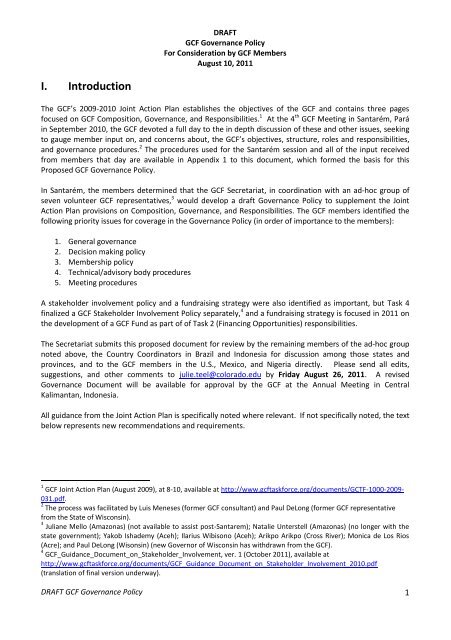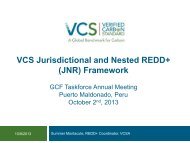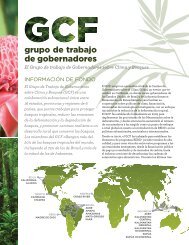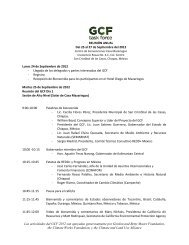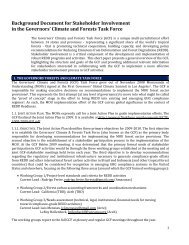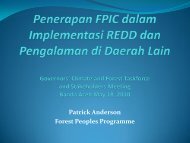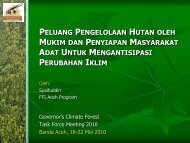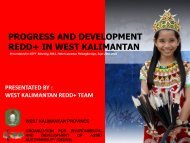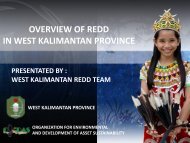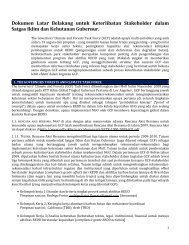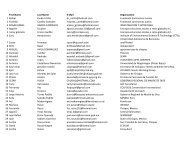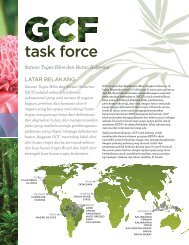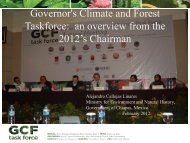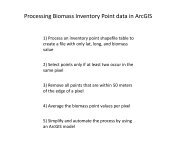English - GCF
English - GCF
English - GCF
You also want an ePaper? Increase the reach of your titles
YUMPU automatically turns print PDFs into web optimized ePapers that Google loves.
DRAFT<strong>GCF</strong> Governance PolicyFor Consideration by <strong>GCF</strong> MembersAugust 10, 2011I. IntroductionThe <strong>GCF</strong>’s 2009-2010 Joint Action Plan establishes the objectives of the <strong>GCF</strong> and contains three pagesfocused on <strong>GCF</strong> Composition, Governance, and Responsibilities. 1 At the 4 th <strong>GCF</strong> Meeting in Santarém, Paráin September 2010, the <strong>GCF</strong> devoted a full day to the in depth discussion of these and other issues, seekingto gauge member input on, and concerns about, the <strong>GCF</strong>’s objectives, structure, roles and responsibilities,and governance procedures. 2 The procedures used for the Santarém session and all of the input receivedfrom members that day are available in Appendix 1 to this document, which formed the basis for thisProposed <strong>GCF</strong> Governance Policy.In Santarém, the members determined that the <strong>GCF</strong> Secretariat, in coordination with an ad-hoc group ofseven volunteer <strong>GCF</strong> representatives, 3 would develop a draft Governance Policy to supplement the JointAction Plan provisions on Composition, Governance, and Responsibilities. The <strong>GCF</strong> members identified thefollowing priority issues for coverage in the Governance Policy (in order of importance to the members):1. General governance2. Decision making policy3. Membership policy4. Technical/advisory body procedures5. Meeting proceduresA stakeholder involvement policy and a fundraising strategy were also identified as important, but Task 4finalized a <strong>GCF</strong> Stakeholder Involvement Policy separately, 4 and a fundraising strategy is focused in 2011 onthe development of a <strong>GCF</strong> Fund as part of of Task 2 (Financing Opportunities) responsibilities.The Secretariat submits this proposed document for review by the remaining members of the ad-hoc groupnoted above, the Country Coordinators in Brazil and Indonesia for discussion among those states andprovinces, and to the <strong>GCF</strong> members in the U.S., Mexico, and Nigeria directly. Please send all edits,suggestions, and other comments to julie.teel@colorado.edu by Friday August 26, 2011. A revisedGovernance Document will be available for approval by the <strong>GCF</strong> at the Annual Meeting in CentralKalimantan, Indonesia.All guidance from the Joint Action Plan is specifically noted where relevant. If not specifically noted, the textbelow represents new recommendations and requirements.1 <strong>GCF</strong> Joint Action Plan (August 2009), at 8-10, available at http://www.gcftaskforce.org/documents/GCTF-1000-2009-031.pdf.2 The process was facilitated by Luis Meneses (former <strong>GCF</strong> consultant) and Paul DeLong (former <strong>GCF</strong> representativefrom the State of Wisconsin).3 Juliane Mello (Amazonas) (not available to assist post-Santarem); Natalie Unterstell (Amazonas) (no longer with thestate government); Yakob Ishademy (Aceh); Ilarius Wibisono (Aceh); Arikpo Arikpo (Cross River); Monica de Los Rios(Acre); and Paul DeLong (Wisonsin) (new Governor of Wisconsin has withdrawn from the <strong>GCF</strong>).4 <strong>GCF</strong>_Guidance_Document_on_Stakeholder_Involvement, ver. 1 (October 2011), available athttp://www.gcftaskforce.org/documents/<strong>GCF</strong>_Guidance_Document_on_Stakeholder_Involvement_2010.pdf(translation of final version underway).DRAFT <strong>GCF</strong> Governance Policy 1
II.General GovernanceA. Governance StructureB. Roles and Responsibilities of <strong>GCF</strong> Governance Bodies & Participants1. GovernorsThe <strong>GCF</strong> Governors are required to designate two representatives to the <strong>GCF</strong> (JAP at 8). They are alsoexpected to provide high-level input to the <strong>GCF</strong> process, ensure the <strong>GCF</strong> delegates have the time andresources they need to participate in the <strong>GCF</strong> process, and facilitate a smooth transition to new leadershipwhen relevant.2. <strong>GCF</strong> AssemblyThe “<strong>GCF</strong> Assembly” refers to the body of <strong>GCF</strong> state and province representatives, which makes executivedecisions on key matters for the <strong>GCF</strong> (JAP at 9). It is composed of 2 representatives selected by theGovernor of each member state and province (JAP at 8). 5 Governors may designate individuals from NGOsand other entities to act as representatives for the states and provinces (JAP at 8). Each <strong>GCF</strong> state/provincecan designate additional observer, non-voting governmental participants in <strong>GCF</strong> activities from theirstate/province (JAP at 8).Starting in 2011, the Assembly meets once a year and (more informally) at the UNFCCC Conference of theParties. The Assembly is responsible for making major decisions relevant to the activities of the <strong>GCF</strong>,5 The founding states and provinces are Acre, Amapá, Amazonas, Mato Grosso, Pará, Aceh, Papua, California, Illinois,and Wisconsin (which withdrew in 2011). The other 2011 <strong>GCF</strong> members are East Kalimantan, West Kalimantan, CrossRiver State, Campeche and Chiapas.DRAFT <strong>GCF</strong> Governance Policy 2
including approving key <strong>GCF</strong> policy documents, the admission of new members, and fundamental changes inthe role or composition of the <strong>GCF</strong>. It oversees the work of the Secretariat, Coordinators, and the <strong>GCF</strong>Technical Advisory Bodies.The <strong>GCF</strong> Assembly is led by the Chair state or province who serves for one calendar year (JAP at 8) (see Chairbelow).Observer states, provinces, and other government representatives and other stakeholders are permitted toattend <strong>GCF</strong> meetings and offer input to the <strong>GCF</strong> and Technical Advisory Bodies, with the exception of closedsessions limited to <strong>GCF</strong> members (see Observers below).3. <strong>GCF</strong> Members & Representatives (see also New Member Policy below)The <strong>GCF</strong> members are those states and provinces that were (1) part of the founding member group(signatories of 2008 MOUs and Acre, see supra fn 5); or (2) nominated by a founding <strong>GCF</strong> member andapproved for formal membership by consensus (see Decisionmaking below) by the <strong>GCF</strong> Assembly (JAP at 8-9). Members are expected to: 61. Make executive decisions on recommendations to implement the MOU forest sector provisions (JAPat 10).2. Work with the other members to coordinate <strong>GCF</strong> activities with their respective nationalgovernments (JAP at 10).3. Respond to <strong>GCF</strong> communications and deliverables.4. Attend and actively participate in <strong>GCF</strong> meetings and Technical Advisory Bodies.5. Engage with stakeholders in their state/province.6. Nominate stakeholders. 77. Create and dissolve Technical/Advisory bodies.8. Nominate technical representatives to participate on the Technical/Advisory bodies.9. Assist the Secretariat in identifying needed consultant and expert support.10. Ensure smooth transitions between administrations or during other time of staff turnover.11. Disseminate information about <strong>GCF</strong> activities.12. Identify institutional and funding support for their <strong>GCF</strong> activitie .13. Regularly update the <strong>GCF</strong> members, Coordinators and Secretariat about REDD+ advances in theirstate/province, including through the <strong>GCF</strong> REDD+ Knowledge Database effort.4. Chair 8The <strong>GCF</strong> Assembly is led by a Chair. The chairmanship of the <strong>GCF</strong> rotates annually and must be held by adifferent state or province and country every year (JAP at 8). The Chair is selected and voted upon by theAssembly and begins duties on the 1 st of the following year. The Chair is expected to:1. Help to organize and define the agenda for the <strong>GCF</strong> Assembly meeting.2. Lead the <strong>GCF</strong> Assembly Meeting in coordination with the Secretariat.3. Develop the annual workplan with the Secretariat and members.4. Identify and secure finances to implement <strong>GCF</strong> activities.5. Coordinate with <strong>GCF</strong> states and provinces through regular meetings (telephone and otherwise).6. Assist with new member issues and recruitment (particularly from the demand side).7. Assist with stakeholder/intergovernmental outreach and coordination.6 Note: Many/most of these were from Brazilian input. Need to consider whether to streamline, add others, etc.7 Note: this was a Brazilian recommendation, need clarification on what they mean.8 Note: the Indonesians wanted a co-chair, one from developing country state/province, one from a demandstate/province. But with only 2 demand side, CA and IL, this is not really feasible.DRAFT <strong>GCF</strong> Governance Policy 3
8. Conduct decision-making processes and consulting with the members when there is a need for suchactions outside of the <strong>GCF</strong> Assembly Meeting.5. SecretariatThe <strong>GCF</strong> Secretariat is comprised of a small paid professional staff currently based at the University ofColorado. The Secretariat of the <strong>GCF</strong> has the authority to coordinate the work of the <strong>GCF</strong>, keep the effortsof the <strong>GCF</strong> running smoothly, and ensure the continuity of the <strong>GCF</strong>’s efforts. The Secretariat is responsiblefor:1. Communicating with <strong>GCF</strong> Chairs and Assembly members using methods that keep lines ofcommunication clear and open.2. Implementing decisions and strategic planning approved by the state members.3. Ensuring that work products are completed and deadlines are met by <strong>GCF</strong> working groups andconsultants.4. Working with members to produce and review of background documents for the <strong>GCF</strong> meetingsand other <strong>GCF</strong> reports.5. Interfacing with <strong>GCF</strong> members, donors, NGOs and other stakeholders and partners on behalf ofthe <strong>GCF</strong>.6. Assisting in outreach and coordination with the broader REDD policy community.7. Keeping the <strong>GCF</strong> informed of relevant issues in the broader REDD policy debates that couldimpact the <strong>GCF</strong> process.8. Overseeing the <strong>GCF</strong> process, grant administration, and project management, includingcoordinating all technical and financial reports to the donors, coordinating and helping facilitatemeetings and activities amongst the states, consultants, and stakeholders, and retainingTechnical/Advisory Body consultants.6. Technical/Advisory Bodies & Consultants (see also Technical/Advisory BodyProcedures below)The <strong>GCF</strong> Technical/Advisory Bodies develop recommendations regarding the regulatory and institutionalinfrastructure necessary to generate compliance-grade offsets from REDD and other international forestcarbon activities. The <strong>GCF</strong> currently has 7 Technical/Advisory Bodies: 3 Working Groups formed in 2009;and 4 Task Groups formed in May 2010 specifically to guide activities from Aceh into 2011. The WorkingGroups are currently “dormant” as the <strong>GCF</strong> focuses on the implementation of the Task Group mandates.The <strong>GCF</strong> Secretariat and the Working Groups/Task Groups may organize technical workshops to produceissue-specific technical work, the results of which will be reported to the <strong>GCF</strong> Assembly. The <strong>GCF</strong>consultants are individuals or organizations retained by the <strong>GCF</strong> Secretariat in response to a <strong>GCF</strong> Assemblyor Technical Advisory Body need to prepare a specific deliverable or deliverables for the <strong>GCF</strong>’sconsideration. 9 7. <strong>GCF</strong> CoordinatorsIn 2010, the <strong>GCF</strong> created the positions of <strong>GCF</strong> Coordinators for the 5 <strong>GCF</strong> states in Brazil and 5 <strong>GCF</strong> provincesIndonesia. The States/Provinces are involved in the selection and renewal processes for the Coordinators.<strong>GCF</strong> Coordinators are expected to:1. Communicate regularly with the <strong>GCF</strong> member states to provide input to the Chair, Secretariat, andCountry Coordinator for Indonesia.2. Facilitate information-sharing opportunities and technical support for the <strong>GCF</strong> states/provinces.9 To date, the <strong>GCF</strong> has retained John Nickerson (CAR 2009), Terra Global Capital (Working Group 2, Task 1, 2010), JohnO. Niles/Tropical Forest Group (Task 1, 2, 2010-2011), Luis Meneses (Task 3 Brazil, 2010), Emerald Planet/Jim Davie &Toby Garrit (Task 3 Indonesia, 2010-2011), and Keyvan Izadi (Task 3, Annual Meeting assistance, Summer/Fall 2011) forspecific deliverables.DRAFT <strong>GCF</strong> Governance Policy 4
3. Act as the hub for the states/provinces to collaborate among themselves and with the federalgovernment in an effort to develop a common approach to REDD.4. Assist in the effort to develop deeper collaborations with current and potential partners.5. Assist in the organization of and state/province participation in the <strong>GCF</strong> meetings.6. Participate on the Technical/Advisory Bodies.7. Facilitate information-sharing opportunities and technical support for the <strong>GCF</strong> states/provinces.8. Act as the hub for the states/provinces to collaborate among themselves in an effort to develop acommon approach to REDD.9. Assist in the organization of state/province participation in the <strong>GCF</strong> meetings.10. Assist with translating <strong>GCF</strong> documents and communications.11. Forward meeting notes and other relevant documents that have been approved by the states andprovinces in Indonesia or Brazil to the Secretariat.The <strong>GCF</strong> Secretariat serves in this role informally for California, Illinois, Campeche, Chiapas, and Cross RiverState.8. Observers (see also Observer & New Member Procedures below)Observers are states and provinces the <strong>GCF</strong> has invited to attend a <strong>GCF</strong> Assembly meeting and otherwiseparticipate in open <strong>GCF</strong> activities. They are nominated for this role by one of the 15 current <strong>GCF</strong> members,which must seek and obtain approval of the observer by consensus from the <strong>GCF</strong> members (see Proceduresbelow). While there are no formal rules about participation, it is expected that observers participate in allsessions of the <strong>GCF</strong> Assembly meeting except for closed <strong>GCF</strong> business sessions.As a general matter, the <strong>GCF</strong> does not fund observers to attend the <strong>GCF</strong> Asssembly meeting. However, insome years, the <strong>GCF</strong> does have a modest amount of funding to support a limited number of observers toattend the Annual Meeting.9. Stakeholders<strong>GCF</strong> Stakeholders are non-governmental organizations (representatives from non-state/province entities,including non-profit organizations, academia, the private sector, and inter-governmental organizations) andindividuals who have expressed interest in being involved in the <strong>GCF</strong> activities. This may be in one of severalways, including (1) a <strong>GCF</strong> member invited them to participate on a <strong>GCF</strong> Technical Advisory Body; (2) thestakeholder expressed interest in staying informed of the <strong>GCF</strong> activities; and/or (3) the stakeholderexpressed interest in attending the open portions of a <strong>GCF</strong> workshop or meeting (to date <strong>GCF</strong> meetings havebeen open to any interested individuals, limited only by space and resource limitations). More informationabout stakeholder involvement is available in the <strong>GCF</strong> Guidance Document on Stakeholder Involvement. 1010. Partners/Donors<strong>GCF</strong> Partners/Donors include entities that provide support to the <strong>GCF</strong>, most notably the funders of theproject to date: The Gordon and Betty Moore Foundation (2009, 2010, 2011), ClimateWorks Foundation(2010, 2011), and the David and Lucile Packard Foundation (2009).III. Decision making procedures 111. Each member state and province has one (1) voting member and decisions are made byconsensus where possible (JAP at 8).10 http://www.gcftaskforce.org/documents/<strong>GCF</strong>_Guidance_Document_on_Stakeholder_Involvement_2010.pdf.11 Note: it was unclear what if any additional detail the members are looking to include. Would be helpful to getfeedback on whether this is sufficient.DRAFT <strong>GCF</strong> Governance Policy 5
2. Where there is no consensus, the majority vote is followed, with dissenting opinions oralternative views noted (JAP at 8).IV.Observer & new member proceduresA. Observers1. Observers are states and provinces the <strong>GCF</strong> has invited to attend a <strong>GCF</strong> Assemblymeeting and otherwise participate in open <strong>GCF</strong> activities (see above).2. They are nominated for this role by one of the 15 current <strong>GCF</strong> members, which mustseek and obtain approval of the observer from the <strong>GCF</strong> members by consensus (seeabove).3. An observer nomination must be accompanied by a letter of interest from a highrankingoffical in the proposed observer state/province, which describes its interest inthe <strong>GCF</strong> and REDD and includes who their designated representative is for purposes of<strong>GCF</strong> communication.4. Observers may participate in all sessions of the <strong>GCF</strong> Assembly meeting except for closedsessions designated for member states and provinces only.5. Observer states may express interest in becoming full members to a founding memebrof the <strong>GCF</strong>, who will then institute the new member process described below.Observers may also choose to remain as observers.6. Observers can also include representatives from international, federal and localgovernmental entities merely interested in observing the <strong>GCF</strong> Assembly and being keptapprised of <strong>GCF</strong> activities, but they are not eligible to become full members.7. As a general matter, there is no funding to support observer attendance at <strong>GCF</strong>meetings.B. New Members1. A founding <strong>GCF</strong> member (California, Illinois, Acre, Amapa, Amazonas, Para, MatoGrosso, Aceh, and Papua) must submit a formal nomination letter for a proposed newmember state/province (JAP at 9) that explains why the state/provide should beadmitted to <strong>GCF</strong>.2. A new member nomination must be accompanied by a letter from the Governor of theproposed new member state/province, which indicates who tits designated<strong>GCF</strong>representatives would be, explains the state/province’s interest in becoming amember, and provides background information about the state/province’s forests,deforestation drivers and rates, experience with REDD+, REDD+-related laws, policies,projects and programs (both existing and planned), any other relevant information. 123. Votes on new members must take place at the <strong>GCF</strong> Assembly meeting, except underspecial circumstances.4. New members must be accepted by consensus (JAP at 9).5. New members will have the same rights as founding members (JAP at 8).6. New members are required to adopt all key <strong>GCF</strong> documents (JAP at 9).7. New members are expected to engage as outlined in Section 3 (<strong>GCF</strong> Members &Representatives) above.V. Technical/advisory body procedures 1312 Note: there has been discussion in the past about whether there should be additional membership criteria(recruitment, removal/retirement of members)—this is still an open questions.13 Note: we need more guidance on what the states/provinces want to see here. We could add the requirement (asone member suggested in Santarem) that <strong>GCF</strong> members are required to participate actively on at least oneDRAFT <strong>GCF</strong> Governance Policy 6
1. The <strong>GCF</strong> Assembly forms the Technical/Advisory Bodies by consensus.2. The <strong>GCF</strong> Technical/Advisory Bodies develop recommendations regarding the regulatoryand institutional infrastructure necessary to generate compliance-grade offsets fromREDD and other international forest carbon activities.3. The Technical/Advisory Bodies in coordination with the Secretariat may recruit <strong>GCF</strong>members, stakeholders, and private consultants to participate on and produce the workproducts of the Technical/Advisory Bodies.4. The <strong>GCF</strong> Working Groups/Task Groups report to the <strong>GCF</strong> Assembly and are supervisedby the Leads (designated either by the <strong>GCF</strong> Assembly or by the Working Group/TaskGroup members) and by the Secretariat. 145. The Lead is responsible for framing the Body’s objectives, developing the timeline for itsdeliverables, dedicating time to completion of the deliverables (including overseeingwith the Secretariat any consultants retained by the Working Group/Task Group for thispurpose as well as engaging with the Group’s members to provide input), andencouraging the participation and input of stakeholders into its work products.6. The <strong>GCF</strong> Secretariat and the Working Groups/Task Groups may organize technicalworkshops to produce issue-specific technical work, the results of which will bereported to the <strong>GCF</strong> Assembly.VI. Meeting procedures 151. There is one <strong>GCF</strong> Annual Meeting per year 16 and one less formal gathering at theUNFCCC COP (see above).2. The agenda for these meetings is developed by the Chair, Secretariat, and Coordinators,with input from the <strong>GCF</strong> members and consultants.3. The Chair runs the Annual Meeting with assistance from the Secretariat andCoordinators.4. Participation is open to stakeholders whenever feasible, but some meetings or sessionsare have limited capacity and/or are closed for resolution of internal <strong>GCF</strong> matters.5. Additional workshops and meetings occur in the <strong>GCF</strong> regions, depending on thepriorities and funding available for a given year.Technical/Advisory Body. However, the reality is that getting state and province input and participation throughout theyears has been challenging. As a practical matter, most have not had the time to engage.14 Note: currently, the 4 Task Groups are supervised and led by the Secretariat. It has been very challenging to getstate/province representatives to participate in these groups substantively and regularly throughout the year. Usuallyeven with state/province leads designated it is the Secretariat, Coordinators and consultants who have the time to dothe work required. As a result, the current approach has been to work on the 4 Task Group objectives, and send newsand deliverables for review to the Country Coordinators and all <strong>GCF</strong> members when ready for input. We need todiscuss what approach is desirable and practical here.15 Note: what else did the states envision, is more necessary? Our meetings have gone quite well. Please get moreguidance on what the states/provinces want to see—we do not want to add too much detail here that limits the <strong>GCF</strong>ability to create different kinds of agendas based on the needs and priorities of that year.16 Note: the <strong>GCF</strong> Annual Meeting location rotates, it is never in the same location twice in a row, but there are no <strong>GCF</strong>rules governing this issue. It may be a good idea to leave this flexible because it may even make sense to hold anAnnual Meeting outside of the <strong>GCF</strong> states and provinces for ease of travel, to coincide with another important event oropportunity, etc.DRAFT <strong>GCF</strong> Governance Policy 7


